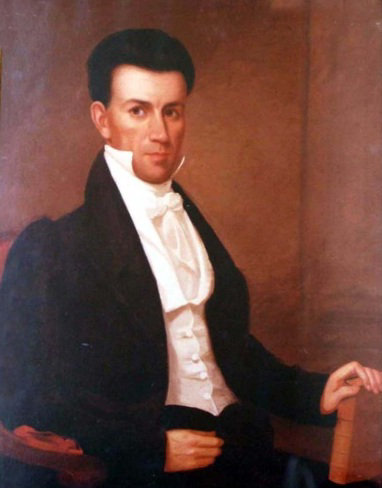Get Today in Masonic History into your Inbox. Sign up today for one of our email lists!
Need an article for your Trestleboard/Newsletter see our Use Policy
Clement Comer Clay is Born

Today in Masonic History Clement Comer Clay is born in 1789.
Clement Comer Clay was an American politician.
Clay was born on December 17th, 1789 in Halifax County, Virginia. He graduated from local schools and then attended East Tennessee College. He graduated from the school in 1807. In 1809 he passed the bar and moved to Huntsville in the Alabama Territory. In 1811 he opened a private practice there.
In 1815 Clay married Susannah Claiborne Withers. The couple had three sons, the most notable of the three was Clement Claiborne Clay who's image was on the Confederate $1 note.
Clay began his political career by being elected to the Alabama Territorial Legislature serving from 1817 to 1818. After Alabama was admitted to the Union in 1819, Clay served as a state court judge and served in the Alabama House of Representatives.
In 1828 Clay was elected to the Untied States House of Representatives where he served from 1829 until 1835. When he left the House of Representatives he had already been elected as Governor of Alabama. As Governor he signed a legislative act which chartered Spring Hill College in Mobile, Alabama the third oldest Jesuit school in the United States. The charter granted the school "full power to grant or confer such degree or degrees in the arts and sciences, or in any art or science as are usually granted or conferred by other seminaries of learning in the United States." The College came from the strong French Catholic roots of the original French Colony which became Mobile.
In 1836, Clay's term was dominated by the Creek War. This was caused by resistance to Indian removal which had taken place in the Southeast during most of the 1830's. Clay's administration and the United States Army removed Creek Indians, moving them to what became Oklahoma. In Alabama there were constant clashes between Creek Indians and white settlers. During the Panic of 1837, while Clay was still Governor, there was a run on the Bank of the State of Alabama. Clay ordered the bank to provide a detailed report of it's finances and they were unable to do so.
His term as Governor was cut short in 1837, when he was appointed by the Alabama State Legislature as a United States Senator, Senators were not elected until the 17th Amendment of the Constitution was passed in 1912 and ratified in 1913. He served in the United States Senate until 1841 when he resigned.
Clay passed away on September 7th, 1866, the year after the American Civil War ended.
Clay was a member of Alabama Lodge No. 21 in Alabama.
This article provided by Brother Eric C. Steele.

